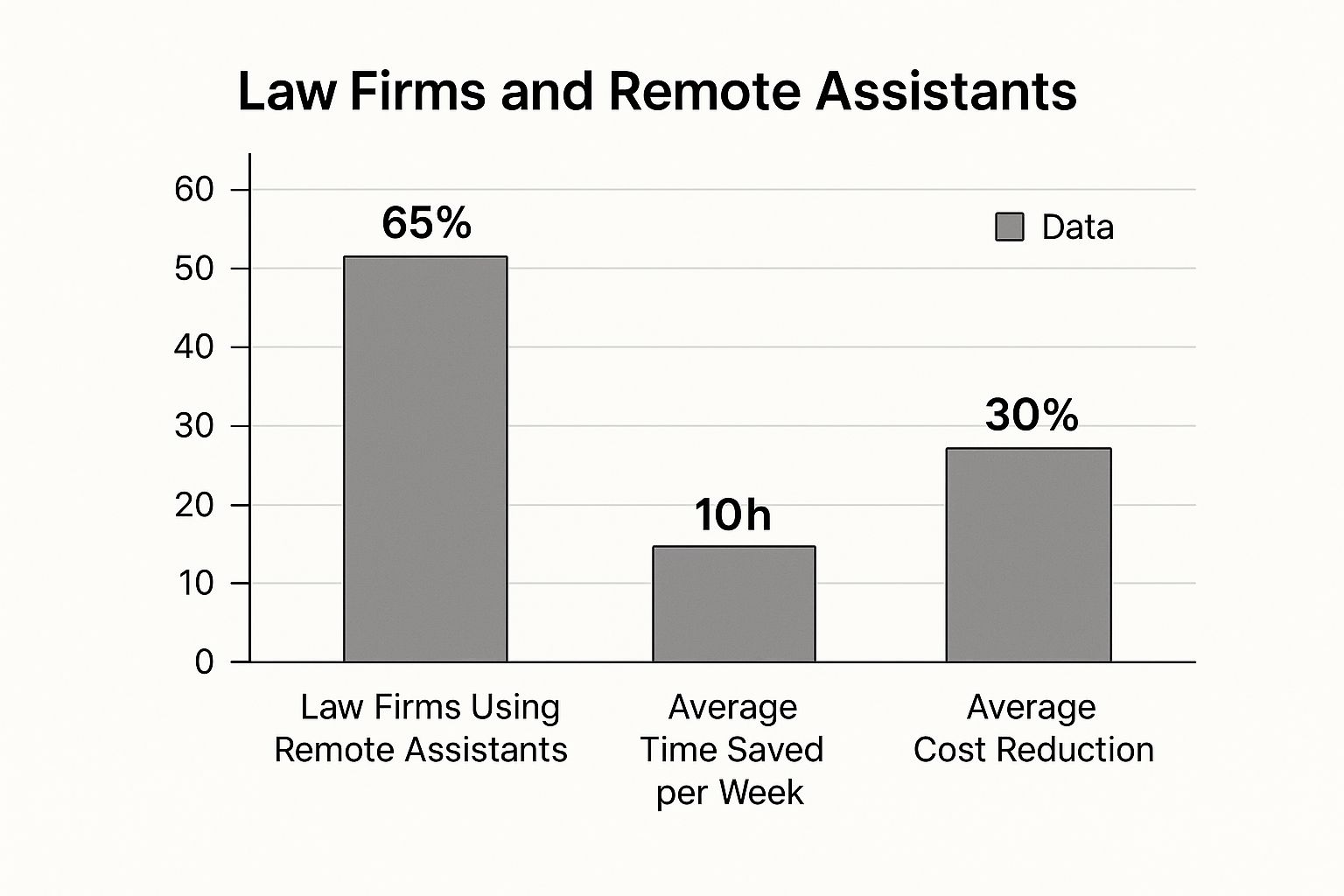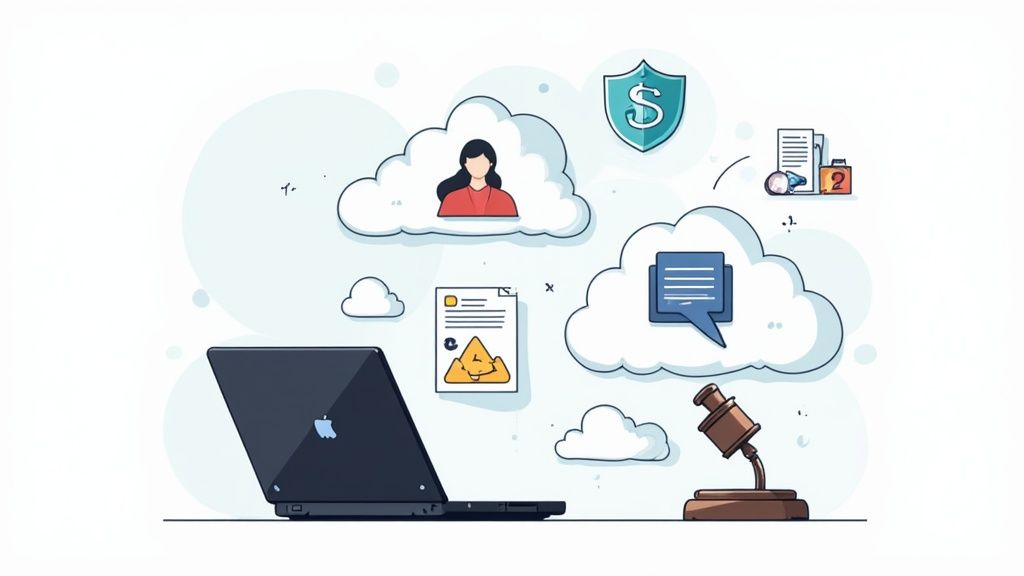
 23 minutes read
23 minutes read
A remote legal assistant is a skilled professional who handles your firm’s administrative, clerical, and research tasks from a distance. Think of them as the backbone of your practice, just without the overhead of an extra desk, computer, and a slice of the office birthday cake.
Let's be blunt. You think you're running a tight ship, but your top lawyers are drowning in administrative quicksand. They're spending priceless, billable hours wrestling with calendars, chasing down signatures, and formatting documents that frankly, they shouldn't be touching.
This slow drain is the silent killer of your firm's profitability. Every minute a partner spends trying to get a client on the phone or tracking down a misplaced exhibit is a minute they aren't billing. Hope you enjoy spending your afternoons fact-checking routine paperwork—because that’s now your full-time, non-billable job.
The math is brutal. Research shows that actual billable work represents only about 2.3 hours of a lawyer’s typical day, with the rest eaten up by administrative duties. A skilled remote legal assistant can handle around 80% of these non-billable tasks at roughly one-third the cost of a traditional paralegal, massively boosting productivity. You can dive deeper into why you should hire a legal virtual assistant and see the numbers for yourself.
It’s easy to ignore these "soft" costs until you see them on paper. That hour spent scheduling depositions? At a partner's rate of $500/hour, that was a $500 "hello" to a simple calendar invite.

The old model burns out your best people and leaves a fortune on the table. The real risk isn't trying something new; it's sticking with the status quo while your competitors get leaner, faster, and more profitable.
This isn't just about saving a few bucks. It's about reallocating your most valuable resource—your legal team's brainpower—to the work that actually matters: winning cases and growing the firm.
Take a look at this breakdown. It shows just how much time and money are silently walking out the door every week when high-value legal staff are bogged down by low-value tasks.
| Administrative Task | Time Spent by Lawyer (Weekly) | Real Cost to Firm | Handled by Remote Assistant? |
|---|---|---|---|
| Scheduling & Calendar Management | 3 hours | $1,500 | Yes |
| Document Formatting & Filing | 4 hours | $2,000 | Yes |
| Client Follow-ups (non-substantive) | 2 hours | $1,000 | Yes |
| Answering Routine Inquiries | 2 hours | $1,000 | Yes |
This isn't a hypothetical scenario; it's the reality for countless firms that haven't made the switch. The data paints a clear picture of how others are already tackling this issue, showing significant gains in efficiency and cost savings.

This visual highlights a simple truth: firms using remote talent aren't just surviving; they're gaining a serious competitive edge by reclaiming time and cutting unnecessary expenses.
So what's the alternative to mortgaging your office ping-pong table to hire another full-time staff member? You stop the bleeding. You diagnose the hidden costs and confront just how much money is slipping through the cracks. A remote legal assistant isn't just a hire; it's a strategic business decision that plugs the leaks in your profitability. This is the wake-up call your bottom line needs.

Let's clear the air. When I say "remote legal assistant," I know what some of you are picturing: a random person in their pajamas, occasionally answering emails between episodes of a true-crime documentary. It’s an outdated image, one that’s fueled by old fears of lost control, spotty availability, and questionable security.
That’s just not what we’re talking about anymore. It’s time to forget those dusty ideas about "virtual help."
Hiring a top-tier legal assistant remote isn't about making a budget cut or finding a temporary fix. It’s a strategic upgrade. Think of it as tapping into a global talent pool of seasoned professionals who live and breathe legal support, armed with the latest tech and ready to hit the ground running. You're no longer limited to hiring someone within a thirty-mile radius of your office. This is about finding the best person for the job, period, regardless of their zip code.
I get it. The legal profession is built on a foundation of confidentiality and precision. The idea of someone outside your four walls handling sensitive case files can feel… risky. But let’s be honest for a second: is your current system of emailing attachments back and forth really the gold standard of security?
A dedicated remote professional operates within a secure, structured ecosystem.
The truth is, the right remote setup is often more secure and efficient than the ad-hoc, in-office processes many firms still rely on.

By 2025, remote work is expected to be a major factor in the legal assistant profession. Projections show 36.2 million Americans will be working remotely, an 87% jump from pre-pandemic figures. Tasks like document prep, legal research, and client communications are perfectly suited for digital tools, which is why the role is adapting so quickly.
This isn't a fringe movement; it's a fundamental shift in how modern law practices operate.
Another common hang-up is availability. "What if I need something right now?" This line of thinking is a relic of the "managing by walking around" era. A great remote assistant isn't just "available"—they are fully integrated into your workflow.
They operate on your time zone, attend virtual team meetings, and provide end-of-day reports that can give you more visibility than you ever got from peeking over a cubicle wall. They aren’t just logging hours; they’re delivering outcomes. If you're struggling to find top-tier talent in your local market, exploring the benefits of hiring a legal assistant remote can be a complete game-changer.
Ultimately, this is about shifting your mindset. You're not losing an employee; you're gaining a specialist. You’re swapping the overhead of a physical desk for access to a professional who is an expert in remote productivity, legal technology, and efficient communication. It's an intentional choice to build a more resilient, talented, and cost-effective team.
It's not a compromise. It's just smarter business.
So, what exactly are you paying for? Let's break it down. When you hire a remote legal assistant, you’re not just getting an extra pair of hands to answer phones or tame your inbox. You're strategically removing the high-volume, low-complexity tasks that are secretly draining your practice and eating up valuable billable hours.
This is all about systemizing the grunt work. Think about every repetitive, time-consuming activity your attorneys or in-house paralegals get stuck with. A top-tier remote assistant doesn't just complete those tasks—they take full ownership, building repeatable processes that make your entire firm run smoother.
This isn’t just a nice idea. It's the practical game plan for getting your calendar back.
First up, let's tackle the daily grind. These are the foundational tasks that prevent a law firm from seizing up. When a dedicated remote professional handles them, they transform from constant distractions into a well-oiled machine.
These aren't just chores; they're the very engine of your practice. Handing them off is the single most important first step to freeing up your legal experts to do actual legal work.
Moving beyond the administrative basics, a skilled remote legal assistant can take on more substantive work that directly pushes your cases forward. They essentially become an extension of your legal team, providing the critical support that keeps the momentum going.
They manage the mechanics of the legal process, so you can stay focused on strategy. That means less time chasing down paperwork and more time building a winning argument.

Imagine your day without the constant stress of e-filing deadlines, tracking down a client for a signature, or transcribing a two-hour deposition. That time you get back is pure profit—both for your firm's bottom line and your own sanity.
A remote assistant can run your entire billing system, from creating and sending invoices to chasing down late payments. They can also handle preliminary legal research, pulling up relevant case law and statutes to give you a solid head start. And yes, they can manage the tedious but vital tasks of e-filing and transcription with precision.
The change isn't just a small improvement; it's a complete shift in how your firm operates. When you see it side-by-side, the value becomes incredibly clear. This is about more than just offloading tasks; it's about fundamentally upgrading how work gets done.
Here’s a look at how delegating these key tasks can transform your firm's efficiency.
| Task | Who Does It Now (In-House Lawyer/Paralegal) | Who Can Do It (Remote Legal Assistant) | Productivity Gain |
|---|---|---|---|
| Initial Client Screening | Associate Attorney | Remote Assistant | Frees up 5+ attorney hours/week |
| Document E-Filing | Paralegal or Lawyer | Remote Assistant | Eliminates deadline stress & admin errors |
| Managing Billing & Invoices | Office Manager or Lawyer | Remote Assistant | Improves cash flow & collection rates |
| Scheduling Depositions | Lawyer's direct involvement | Remote Assistant | Saves hours of back-and-forth emails |
At the end of the day, you’re not just hiring help. You’re investing in a system that empowers your most expensive resources—your attorneys—to focus exclusively on the high-value, billable work they were trained to do. That's how you build a scalable practice.

Alright, let's talk about the practical side of this: actually hiring someone. If your plan is to post a generic ad on a massive job board and hope for the best, you’re in for a rough time. You'll spend weeks sifting through a mountain of resumes from people whose "legal experience" comes from watching every episode of Suits. Twice.
Hiring remote talent, especially for a role that demands such precision and confidentiality, requires a completely different playbook. It's not about finding someone who can just fill a seat; it's about identifying a self-starter who thrives without constant in-person supervision. Trust me, we learned this the hard way so you don't have to.
Your first instinct might be to post on the big-name job sites. My advice? Don't. You will be absolutely buried in applications, and frankly, 90% of them won't be worth the click it takes to open them. It’s a volume game, not a quality one, and your time is far too valuable for that.
Instead, you need to be more strategic. Focus on specialized platforms where the talent pool is already curated for legal skills and remote work. Think of it as fishing in a stocked pond versus casting a wide net into the ocean and hoping you don't just pull up old boots.
This targeted approach saves you from the soul-crushing task of becoming a full-time, unpaid HR manager.
Once you have a shortlist, the interview process needs to be laser-focused on one key question: can this person actually work effectively from a distance? Forget asking about their five-year plan. You need to dig into their real-world remote work habits.
Here are the kinds of questions that separate the true professionals from the pretenders:

The goal isn't just to hire an assistant; it's to hire a remote professional. They are two very different things. The latter comes with the discipline and systems already built-in, which is exactly what you need.
It's worth remembering that globally, only 16% of companies are fully remote. This means that true remote work competency is still a specialized skill set. Given the legal industry's slower adoption curve, finding someone who genuinely gets the demands of working remotely is critical. For more context, you can get insights on how law firms are adapting to remote work and see why this matters so much.
Never, ever bring someone on full-time without a trial run. A paid project or a two-week trial period is the single best way to see how they actually perform. A resume is just a marketing document; a trial project is reality. If you're wondering what a fair rate for this looks like, feel free to explore our guide on current virtual paralegal rates.
Give them a real-world task with a clear deadline and precise instructions.
This isn't about testing their deep legal knowledge—it's about evaluating their communication, attention to detail, and ability to follow directions in a remote setting. How they handle this small project will tell you everything you need to know about how they'll handle your actual caseload. This is your best strategy for making your first remote hire a fantastic one.

If your first impulse after bringing on a remote legal assistant is to install screen-tracking software, let me save you some time and trouble: you’ve already set yourself up for failure. That urge to monitor every click and keystroke is a hangover from the old "management by walking around" model. It’s rooted in a fear of losing control.
But let’s be direct. Managing remote professionals isn't about watching them work; it's about seeing the work get done. Obsessing over a green "active" dot in a chat app won't tell you if discovery responses were filed on time or if the client intake process is running smoothly. It just tells you someone is good at wiggling their mouse.
You need a completely different framework, one built on trust, clarity, and outcomes. The goal isn’t to digitally replicate your physical office—that’s just a fast track to burnout. It's to build a more efficient, results-focused working relationship that benefits everyone.
Effectively managing a remote legal assistant comes down to a few core principles. This is far less about surveillance and much more about structure. Get these pillars right, and you'll stop worrying about "screen time" for good.
This isn’t about being soft; it’s about being smart. Clear expectations are the rails on which a talented remote assistant can run at full speed.
You don’t need an expensive, overly complicated suite of software to manage your remote assistant. In fact, simpler is almost always better. The objective is visibility, not surveillance. I’ve seen firms waste thousands on clunky platforms when all they really needed were these three core tools.

Think of it this way: You're not managing a person; you're managing a process. The right tools make that process transparent. When the status of the work is always clear, the urge to micromanage becomes totally redundant.
This simple setup provides all the oversight you actually need without making your new team member feel like they’re under a microscope.
Finally, in a remote setting, feedback is everything. In an office, you can often pick up on body language and catch small issues before they snowball. Remotely, you have to build a dedicated space for these conversations.
Schedule brief, regular check-ins. A 15-minute call every Monday and Friday can make a world of difference. Use the Monday meeting to set priorities for the week ahead. The Friday call is for reviewing what was accomplished and flagging any roadblocks.
Most importantly, remember that feedback flows in both directions. Ask your assistant, "What can I do to help you be more effective?" A great remote team member will often spot inefficiencies in your workflows that you're too close to see yourself. By creating psychological safety and a true sense of team, you turn a good hire into an indispensable part of your firm.
We’ve picked apart the why, the what, and the how. At this point, the conversation about hiring a remote legal assistant isn't really a debate anymore. The question is no longer if your firm can benefit. It's whether you’re ready to let go of the old, expensive way of doing things and embrace a smarter, more profitable model.
Let's be blunt. This isn't some passing fad you can afford to ignore. It’s a fundamental shift in how successful law practices operate in the modern world. While you're paying for an oversized office and watching your best lawyers burn out on administrative tasks, your competitors are getting leaner, faster, and more profitable.
The real risk isn’t trying something new. It's the slow, silent decline that comes from clinging to the status quo.
If you’re still on the fence, let’s boil it down. I’ve seen this play out dozens of times, and it almost always comes down to a battle between unfounded fears and undeniable benefits.
The Pros (What Actually Happens):
The Cons (What You're Worried About):

The choice is simple: keep overpaying for inefficiency, or invest in talent that actually moves the needle. Fear of the unknown is a terrible business strategy.
Stop theorizing. The only way to know for sure is to test the waters yourself. You don't have to jump in with a full-time hire.
Start small with a well-defined project. Find a reputable platform, pick a promising candidate, and give them a paid trial task. See how it goes.
Once you have a few candidates lined up, make sure you're asking the right questions. We've put together a guide with battle-tested legal assistant interview questions designed specifically to separate the true professionals from the rest.
The evidence is in. The verdict is clear. Now, the only thing left is for you to stop deliberating and start delegating.
Alright, let's get into the questions that are probably running through your mind. If you're still reading, you’re either genuinely curious or looking for a reason to stick with the status quo. Either way, let’s tackle the big concerns head-on.
This is usually the first and most important question. The idea of sensitive client data existing outside your office walls can be unsettling, but let's put it in perspective. How secure is your current setup, really? Are you still emailing confidential attachments back and forth?
A professional remote legal assistant is trained to operate within a secure digital environment. They rely on encrypted cloud storage and secure communication tools, and they're bound by the same strict confidentiality agreements as any in-house employee.
Honestly, their security protocols are often more robust than a small firm's cobbled-together IT. The risk isn't about their location; it's about having solid, consistent security processes, which is exactly what a dedicated remote professional brings to the table.
It costs less than you probably think—and definitely less than a full-time, in-office hire. You're not just saving on the base salary. Think about all the overhead costs you eliminate: office space, a new computer, benefits, and payroll taxes. It’s not a minor discount; it’s a significant change to your firm’s financial model.

The numbers speak for themselves. Law firms that bring on virtual legal assistants often see a 40% increase in billable hours because their attorneys are freed from administrative tasks. On top of that, these firms can cut operational costs by up to 70%.
That kind of savings can completely change your firm's profitability. To get a better sense of the numbers, you can learn more about the impact of virtual legal assistants. You're not just paying less; you're investing in a more efficient way to operate.
If this question is top of mind, it’s a sign you need to shift your management perspective from tracking hours to tracking outcomes. You'll know they're working because the work is getting done. Your client intake will be seamless, documents will be filed ahead of deadlines, and your schedule will finally be under control.
Instead of worrying about whether their status light is green, focus on the results. A good remote assistant will provide consistent updates and communicate clearly. If you establish clear goals and use a shared system to track progress, you’ll have far more insight into their productivity than you ever got from just walking past their desk. If the output is there, you don't need to micromanage the input.
They will only feel disconnected if you treat them that way. Integrating a remote team member successfully just takes a bit of deliberate effort. It's not complicated, but it does require you to be intentional about communication.
The goal is to make them feel like a genuine part of the firm, not just a contractor you hired online. That little bit of extra effort fosters loyalty and creates a much more effective, cohesive team.
Ready to find the right person to help your firm grow? At HireParalegals, we've already vetted thousands of skilled remote legal professionals so you don't have to. We can provide a shortlist of qualified candidates, often in just 24 hours. See how it works at https://hireparalegals.com.